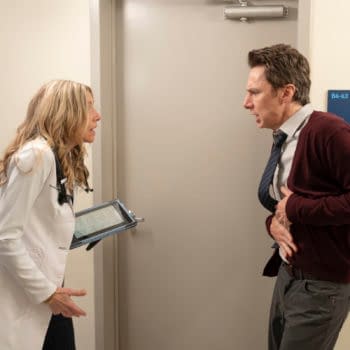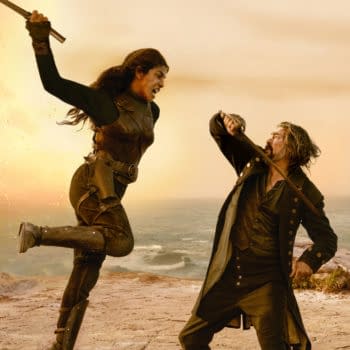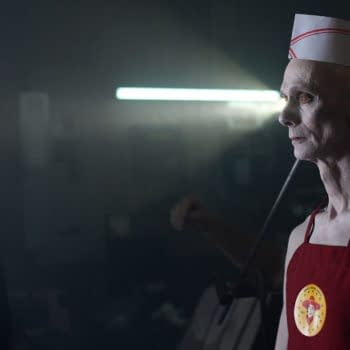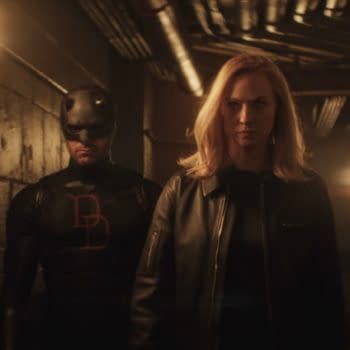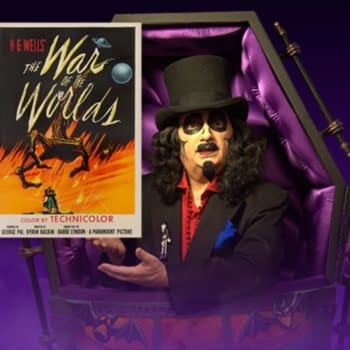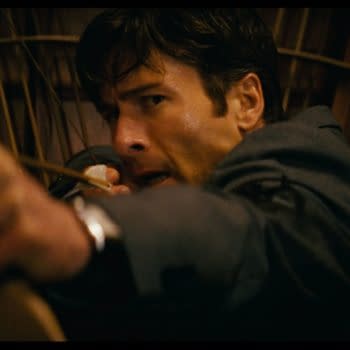Posted in: Exclusive, Horror, Interview, Movies | Tagged: barbara crampton, Bruce Davison, exclusive, heather graham, interview, joe lynch, johnathon schaech, judah lewis, rlje films, shudder
Suitable Flesh Director Joe Lynch on Modernizing Lovecraft & Ending
Director Joe Lynch (Creepshow) spoke to us on updating Lovecraft for modern audiences in RLJE horror-thriller Suitable Flesh, ending & more.
Article Summary
- Director Joe Lynch talks about updating Lovecraft for contemporary audiences with 'Suitable Flesh'.
- Lynch discusses changing Lovecraft's male-centric narratives to be less misogynistic.
- The film brings a new depth to Lovecraft's themes by focusing on female characters and perspectives.
- Lynch reveals that the film's ending was always planned and ties in with Lovecraft's stylistic motifs.
Director Joe Lynch has built himself an impressive filmography with his work in the horror and action scenes with memorable turns in Wrong Turn 2: Dead End (2007), Knights of Badassdom (2013), Everly (2014), Mayhem (2017), and TV's Creepshow. His latest is adapting H.P. Lovecraft's The Thing on the Doorstep along with writing partner Dennis Paoli into RLJE Films & Shudder's Suitable Flesh. The film follows psychiatrist Dr. Elizabeth Derby (Heather Graham), who is obsessed with helping a young patient (Judah Lewis) suffering from an extreme personality disorder. But it leads her into dark occult danger as she tries to escape a horrific fate. Lynch spoke to Bleeding Cool as part of the roundtable that took place before the SAG-AFTRA strike that included Graham, Lewis, and Barbara Crampton about updating Lovecraft to be less misogynistic, taking over for the late Stuart Gordon (who passed in 2020) and if there was an alternate ending to the film. The following contains spoilers.
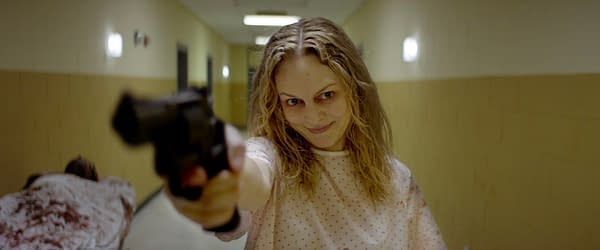
How Lynch Changed Lovecraft's Original Narrative in Suitable Flesh
Bleeding Cool: in capturing the aspects of the Lovecraft story, was there anything complicated working with Dennis on the script and adapting it for the screen as you developed 'Suitable Flesh?'
Lynch: Honestly, it was the first notes session; you could say that was "make or break" when I first got the script. When Barbara sent it, I was intimidated because it was Barbara Crampton sending you a Dennis Paoli script that you knew Stuart was hot to make before he passed. Then, to have that baton passed on to you, I was honestly terrified when I read the script, and I'm going, "I'm digging this, but what if?" My writing partner and I were discussing something that we were a little bit nervous about because I wanted to work with everybody involved. I wanted to be part of this Miskatonic-verse.
I wanted to be able to do a more psychological thriller, something with more erotica, and be able to work in this world. If the note of swapping genders weren't accepted, then that, well, that would have been it. I wouldn't be sitting here talking to you and have worked with all these amazing artisans. That was the thing that was the toughest for me was being able to present and break that bread. Be able to say, "I like this, but what if we did this? Also, do you have intelligent answers or reasoning behind it? It wasn't breaking into Warner Brothers and going, "Fellas, guess what? I got it. It's 'Lethal Weapon' with chicks."
Why? Because it checks off some boxes and makes us look progressive. That was not the reason whatsoever. I had to tell that to Barbara and Dennis immediately. It's not like we're just trying to "chase a trend," if you will. There's something so much more exciting about this story. If we dig deeper, we do this in a way that allows us to explore things that might not have been explored before, at least in cinema. The best email I can remember is Dennis, as a writer, is verbose in most cases. I will never forget it. He wrote back and said, "Very interesting. I'm on it."
Two to three weeks later, Barbara, I don't know if you remember this, the new draft came in, and it wasn't like he changed the names, which would have been so easy in the final draft. He dug deep into the thematics behind it, the real reasoning behind "What would it be like if a woman in this position at this age was exploring something and things beyond her control and this dimension?" What would that be like as opposed to what we're usually used to based on normal tropes in cinema, which is usually male-gaze based, but also in Lovecraft? Lovecraft usually had male protagonists, and he treated women and female characters in it with a little bit of disdain. Unfortunately, they were more objectified, if anything. This was one that we were completely flipping that once I read that, we were off to the races, man.
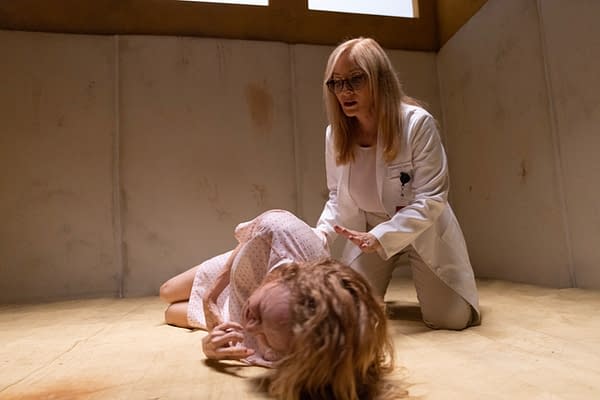
Were there any other endings shot, or was the one you had with Heather and Barbara's characters definite?
That was always planned from the beginning. The idea of spiraling was something that I've always wanted to do. I tried to use that camera rig, but I wanted to ensure it was used for the right reasons. Considering that Lovecraft has a stylistic motif of spiraling and circling, there are a lot of subtle Lovecraftian techniques and motifs in both his work and this film. That was something that I go, "If I'm ever going to use this in a movie, I got to use it in the right way." We found it because I worked with our DP, Dave Matthews. No, not that [musician] Dave Matthews, the other one, but to work with him together and find those right moments, we use those spirals in, for me, deliberate positions, especially like the one with Heather and Jonathan in that pivotal moment. Here are two or three people, if you will, whose lives are being spun out of control. That needed to be there at that moment. The same thing with that last shot that was as exact as I wrote that when you get it, it wasn't in there in the camera sense, but it was in there. When I did my director's pass, I wanted to ensure we had an exact shot. That was one of the last things we shot. Thank God we were able to get it.
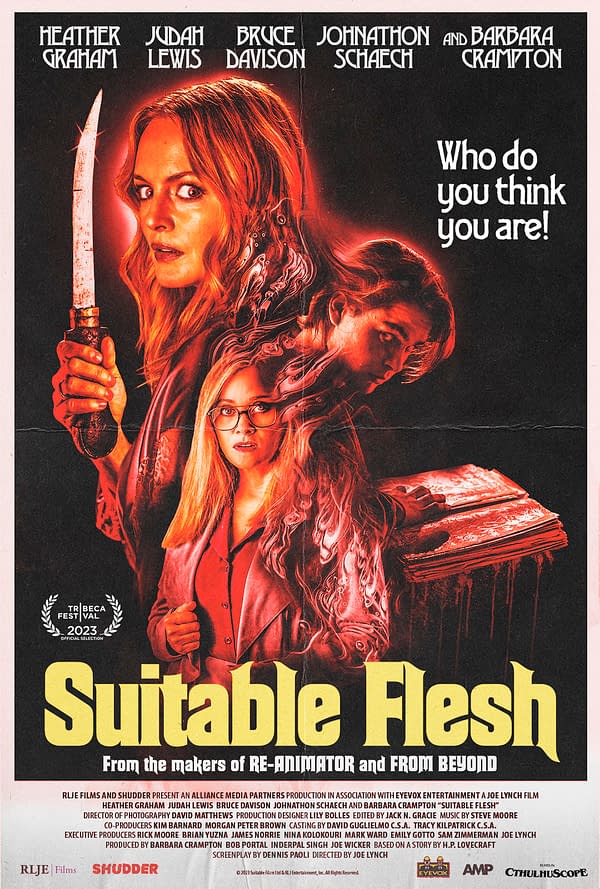
Suitable Flesh, which also stars Bruce Davison, is available in theaters, digital, and on-demand on October 27th.






